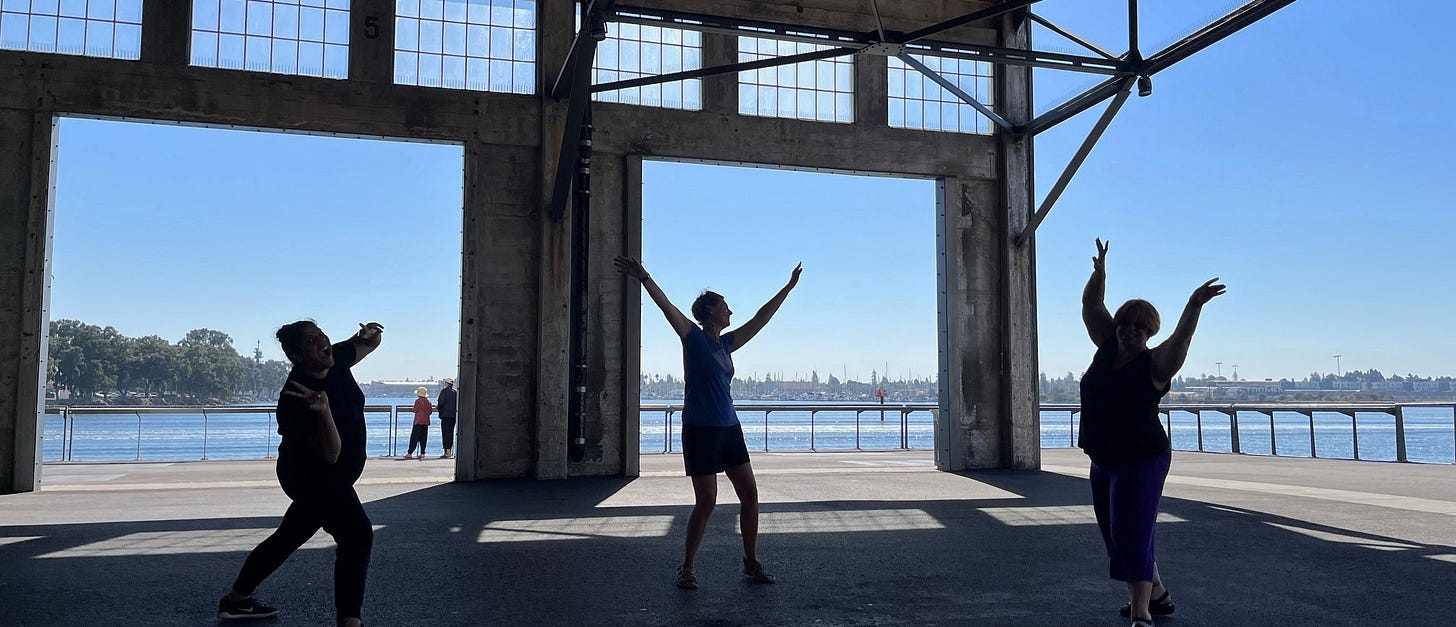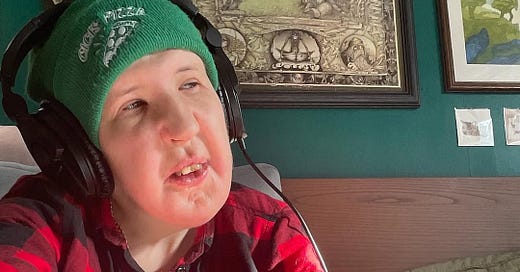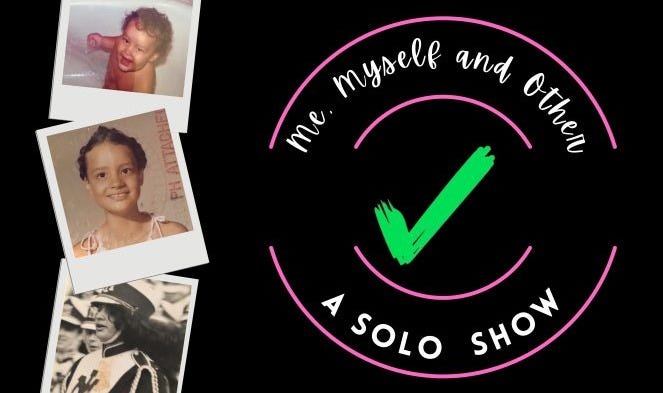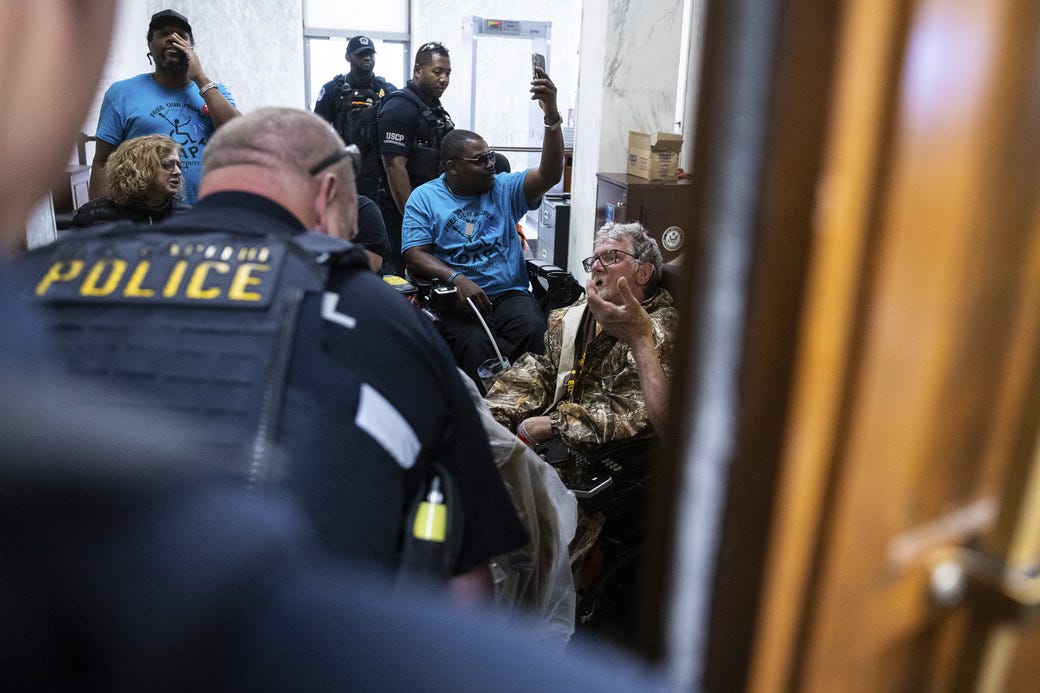Crip News v.185
New works, call, events, a tribute to jes sachse, and getting loud to save Medicaid.
NEWS
New Works
In The Washington Post, disabled author Esmé Weijun Wang writes about discovering the files of a private investigator hired by her insurance company to disprove her disability claim.

In an essay for the Spring 2025 issue of In Dance called “Conducting the Future: How Disability and Improvisation Prepare Us To Be Unprepared,” Stephanie Heit explores the history of her Mad Conductors performance project.
Ik Ben Gewoon Hier (I’m Just Here), curated by Kreukelcollectief/Crip Collective, Eva Burgering, and Bart Rutten, is on view at the Centraal Museum in Utrecht, Netherlands through August 24.
Trevonae K. Williams recently penned “What Chadwick Boseman and I Have In Common: Disability, Black dandyism and the Art of Performance” for Cripple Media.
Me, Myself, and Other, Diana Romero’s solo show directed by Maggie Whittum in which “a heathen crip battles outside forces to finally find herself,” premieres this week at the Cincinnati Fringe Festival.
In an article for Nonprofit Quarterly, James A. Lomastro explains how private equity ownership is driving a crisis in the wheelchair and durable medical equipment industry, causing life-altering repair wait times and deteriorating service standards.
CALLS
The Autistic Self Advocacy Network (ASAN) is hiring a Plain Language Specialist, Policy Analyst, and Executive Assistant.
The Institute for the Development of Human Arts (IDHA) is hiring an Executive Director. Apply by June 20.
Center For Independence of the Disabled, New York (CIDNY) is seeking NYC-based volunteers to survey polling sites for accessibility for the June 2025 Primary Election during Early Voting (June 14th, 2025 - June 22nd, 2025) or on Election Day (June 24th, 2025).
EVENTS
Long COVID Showed Me the Bottom of American Health Care
TODAY, Wednesday, May 28, 7 - 8:30pm ET, in-person at The Greene Space (NYC)
Please join us for the fifth installment of Theater of War Productions’ new long-form journalism series at WNYC. The acclaimed actors Gary Farmer (Dead Man, Ghost Dog: The Way of the Samurai, Smoke Signals), Irma-Estel Laguerre (Black Panther: Wakanda Forever, Blue Bloods, The Undoing), Tanis Parenteau (Billions, House of Cards, Sweet Summer Pow-Wow), and Lou Diamond Phillips (La Bamba, Stand and Deliver, Prodigal Son) will perform “Long COVID Showed Me the Bottom of American Health Care,” written by Rebecca Nagle for The Atlantic, as a catalyst for a guided audience discussion about the lasting impact of long COVID on individuals and communities nationwide. Rebecca, a prominent Native American/Cherokee activist and journalist, writes movingly about her own struggle with long COVID and the challenges she, her community, and 1 in 20 Americans have faced accessing treatment and care for the disease. The event will be recorded with a live studio audience and broadcast several weeks later on WNYC.
Decolonized Beatz Indigenous World Pride
Friday, May 30 & Sunday, June 1, in-person at the Atlas Performance Art Center on Piscataway Land (“Washington, D.C.”)
Crushing Colonialism presents a two-day global event, celebrating the powerful creativity of 2SLGBTQIA+ Indigenous artists, performers, and storytellers, coinciding with World Pride and amplifying the voices of Indigenous Queer and Two-Spirit people on a global stage.
Rest in Power, jes sachse
jes sachse’s life and work have imprinted on the queer, trans, and disabled worlds of arts and organizing on Turtle Island. “jes was a vital presence,” Tangled Art Gallery said in an Instagram post memorializing jes’s life.
Recently, they were working on a book manuscript about “housing law, weaving the intersection (and lag in law) between the AODA and RTA (Accessibility for Ontarians with Disabilities Act and the Residential Tenancy Act, respectively).”
In their last Facebook post, they reflected on a gold locket they received as a birthday present. Objects like that, they wrote, are “tokens and memory of the ability to find real true love, especially as queer and disabled folks. we existed we loved we were here.”
The Fight to Save Medicaid
Last week, the U.S. House passed H.R. 1, also known as the “One Big Beautiful Bill Act” and the “reconciliation bill.” The bill would extend large tax cuts, including benefits for the richest Americans, and pay for them with substantial damaging changes to Medicaid, or what ADAPT-led protestors on Capitol Hill earlier this month called a lifeline to survival.
The nonpartisan Congressional Budget Office projects the largest cuts to Medicaid, more than $273 billion over 10 years, would come from work requirements to begin next year that would force adults without children to work, volunteer or attend school for 80 hours a month as a condition of enrollment. Hundreds of billions of dollars of other savings would use pointless paperwork to push millions of eligible people off the program.
The harms of this bill are too vast to explain in any simple way. The Senate is preparing to take up the bill next week, when we can expect changes driven by key Republicans.
We cannot lose hope. As Ari Ne’eman, co-founder of the Autistic Self Advocacy Network recently told NPR, disability history offers us a playbook. When the Reagan administration sought to rollback provisions of the hard-won Section 504 in 1980, disability organizers used a two-prong strategy to successfully protect them:
A massive mobilization with “key advocates across the country mobilizing tens of thousands of people to write letters, show up at hearings, engage in aggressive activism,” and…
An insider strategy where “a number of advocates sought to reframe long-standing disability rights priorities in terms [that appealed to people] across the political spectrum.”
Everyone can play a role in this strategy.
GET LOUD
The American Association of People with Disabilities (AAPD) has a Medicaid Defense Hub where you can easily call and write to Congress.









